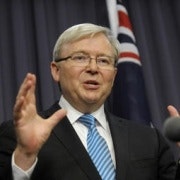The states just gifted Gillard her campaign
The best speech Julia Gillard gave was delivered at 10.15am on November 11, 1998 – her maiden speech to the Australian parliament.
It eloquently set out her vision and values, and it explained her passion for education.
“My predecessor, Barry Jones, used to say that unfortunately postcodes are probably the strongest factor in determining a person’s expectations of success in life. It will be one of my priorities on politics to ensure that in the Australia of the future the famous quizmaster is, for once, wrong”, she said.
Of course, it’s not unexpected that politicians make fine first speeches. They are unencumbered by the brutal truth of life in that big building in Canberra. They start with stars in their eyes, hope in their heart and with a modicum of ambition.
It’s not long before numbers, deals, and reality takes hold.
Fast forward almost 15 years and Prime Minister Gillard is now in a position to do something about her long held passion.
On Friday, she announced that her proposed sweeping reforms to the funding and structures of Australia’s piecemeal education system had failed to meet the approval of state premiers.
The premiers were at one. Campbell Newman and Colin Barnett were scathing. It was all a con. Barry O’Farrell and Denis Napthine weren’t going to sign up. They wanted more time to deal. The new LNP NT chief minister used adjectives to describe his opposition. And so it went on in the post-meeting joint press conference.
And, of course, the media wanted a ‘gotcha’ moment. Some journo called on Gillard for a “show of hands” from the premiers. She refused, staring down and shouting down her inquisitor. We know this because the ABC TV news ran the clip that night on its main news.
Gillard repeated, in detail – and with spirit and conviction – her reasons for pursuing the issue. She was on very comfortable ground as she explained that she intended to pursue the reform with individual states right up ‘til the June 30 deadline.
The politics of this are instructive.
There is no doubt that, despite the bleats from the university sector that will see a reduction in its rate of funding growth to help fund the new deal, that ordinary Australians are instinctively drawn to policy that’s seen as a good thing for primary and secondary schools. Who couldn’t be?
Also, education funding sits easily as part of the Labour brand. It’s part of its DNA.
So here we have a deeply unpopular ALP prime minister openly and defiantly standing up to the special interests and the Conservative and ALP premiers and telling them she won’t quit and won’t hesitate to enrol the mass of voters in her cause.
In a way, the premiers have done Gillard an immense political favour. She now has a popular cause to openly go to war. She has two months – including the distractions of budget week to be dominated by debt – to visit Catholic, independent and state schools in every marginal seat (and the list grows by the day), meet with students, parents, teachers and principals.
She will have a simple mantra from a repetitive and popular song sheet.
No doubt the education unions, government backbenchers, ministers and senators will corral social media, knock on doors, swamp hundreds of local newspapers and radio stations with a simple message: it’s Gillard’s commitment to our kids and grandkids that’s driving this great reform.
Tony Abbott shared a similar response to the Opposition’s slogan riddled Christopher Pyne, who will be the Nation’s Education Minister after September 14.
Pyne is an irritating and shrill performer in the House as Manager of Opposition Business. It’s his political job. But he lacks any empathy or gravitas or passion when it comes to any adult and sensible conversation about education.
His responses to Gillard’s reforms and the process of getting big things done don’t win his party a single vote – unlike Gillard or her minister, the always-pumped-up Peter Garrett.
And Abbott answered questions yesterday. He indicated that as leader of an incoming government he would scrap the Gonski reforms, and that education could be improved without spending “vast dollops of new money”.
That will be music to Gillard’s ears.
This debate about education is not like the debate about the NBN. Malcolm Turnbull has at least saved his party from the difficult politics of outright NBN opposition, and turned it into a debate about money and technology.
This debate is simply about the national government making sure that every Australian kid – irrespective of circumstance – gets close to a world-class go.
It’s easy to mount – and hard to oppose.
And that’s why Gillard will have nothing else on her mind and little else in her diary between now and June 30. And that’s why the states – or most of them – will fold.
It will be a big win on policy and politics, and the hardheads in government will be hoping that good public policy at least morphs into saving seats, and to at least being politically competitive on the day voters cast their judgement. They want a chance to rebuild.
And Julia Gillard will hark back to that bright day 15 years ago, think of Barry Jones and take in her achievement. It will have defined her prime ministership, and – given her background and circumstance – she won’t mind that a bit.













